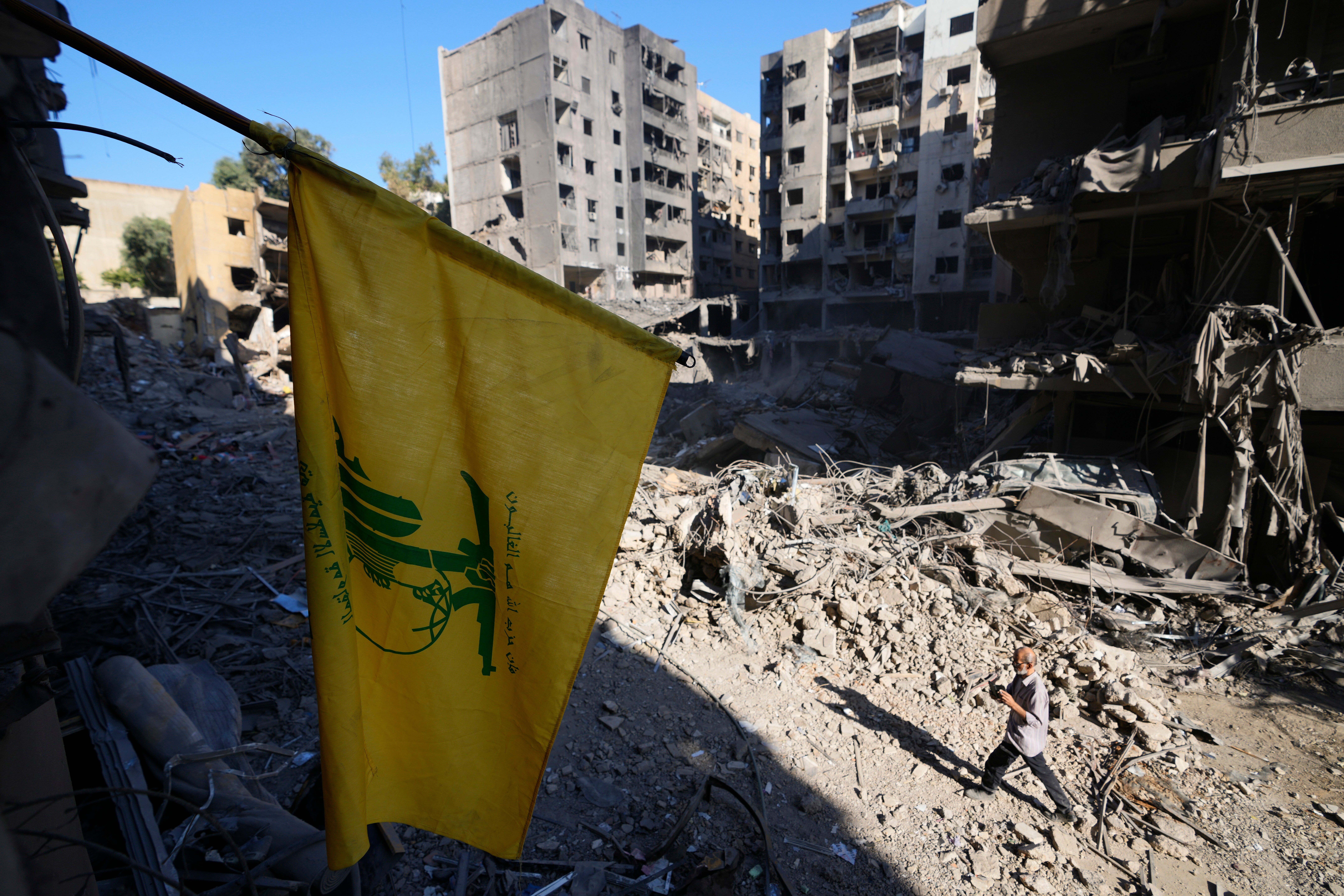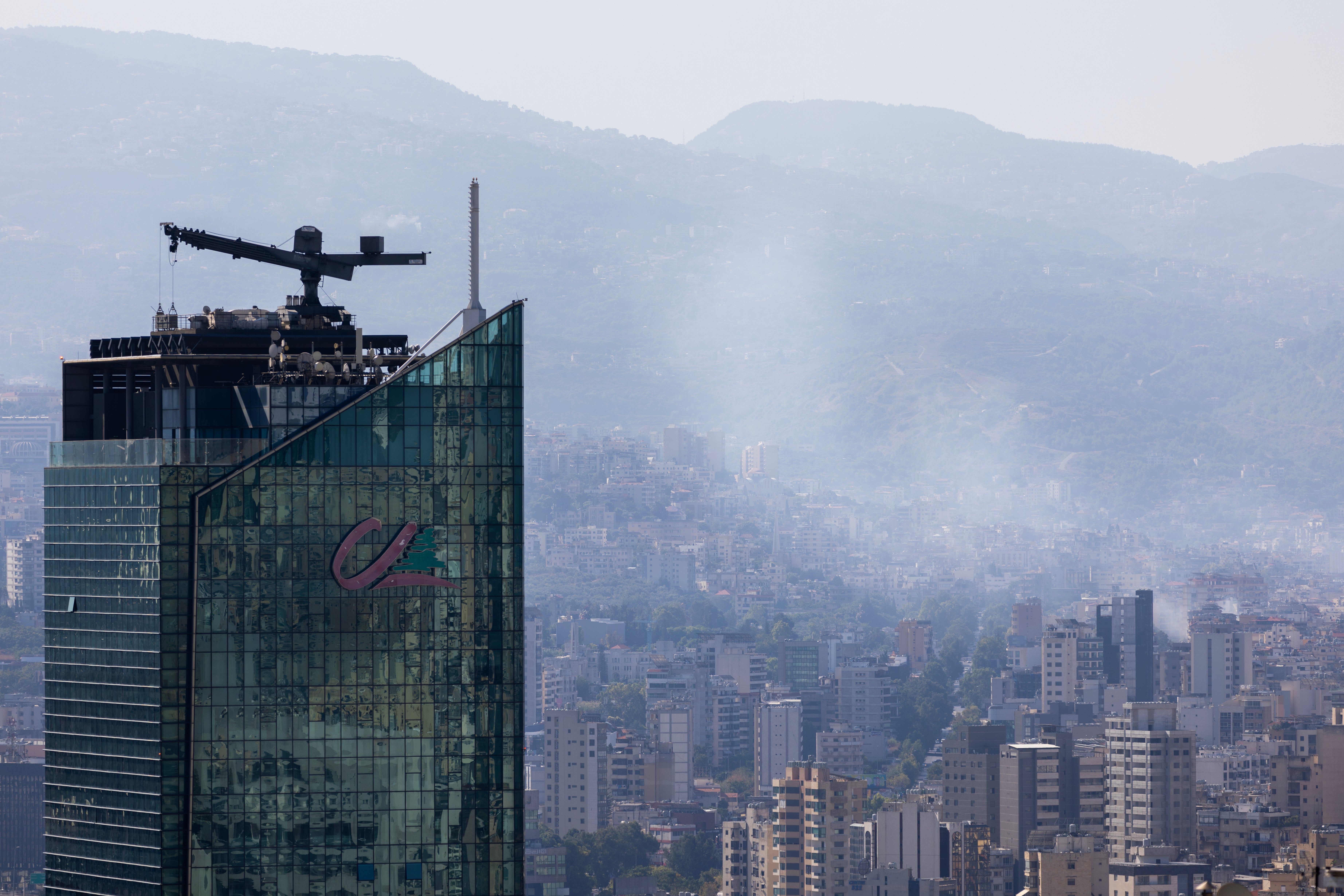This website uses cookies so that we can provide you with the best user experience possible. Cookie information is stored in your browser and performs functions such as recognising you when you return to our website and helping our team to understand which sections of the website you find most interesting and useful.
Your support helps us to tell the story
Our mission is to deliver unbiased, fact-based reporting that holds power to account and exposes the truth.
Whether $5 or $50, every contribution counts.
Support us to deliver journalism without an agenda.

Louise Thomas
Editor
Israel has claimed to have wiped out much of Hezbollah’s leadership in recent airstrikes, as Lebanon said the bombing campaign has now forced a fifth of the country’s population to flee their homes.
The Lebanese militant group has now confirmed the deaths of seven senior officials slain by Israel in just over a week, including its leader of 32 years, Hassan Nasrallah, in a strike Israel claimed also killed 20 other Hezbollah members in southern Beirut on Friday.
Those include founding members of the group first established by Iran’s Revolutionary Guard in 1982, who had previously evaded death or detention at Israel’s hands for decades until Israel’s decision this month to launch its heaviest bombing campaign against Lebanon since the 2006 war.

After Hezbollah confirmed the death of Nabil Kaouk – who led the group’s forces in southern Lebanon during the 2006 war – in another strike on Saturday, the United States warned its ally Israel that “an all-out war with Hezbollah, certainly with Iran, is not the way” to make Israel’s own citizens safer.
As Iran vowed to retaliate and warned that the US is “complicit in all of these crimes”, spokesperson John Kirby said the White House was watching to see what Hezbollah would do to try and fill its leadership vacuum, adding: “It’s going to be tough – much of their command structure has now been wiped out.”
While Israel and Hezbollah had been trading frequent cross-border fire since Hamas’s attack on Israel on 7 October last year sparked the war in Gaza, Israel said this month that it was shifting its focus from Gaza to Lebanon, after launching two shock attacks in which it remotely detonated walkie-talkies and pagers used by Hezbollah.
According to Lebanon’s health ministry, more than 1,000 people – including 87 children and 14 medics – have been killed in the ensuing bombardment, and a further 6,000 wounded, as Unicef warned that the pre-existing humanitarian crisis in Lebanon is “rapidly escalating into a catastrophe”.
Environment minister Nasser Yassin said that around a million people – amounting to a fifth of the population – have fled their homes, with some 250,000 now living in shelters and three to four times as many staying with friends and relatives or camping in the streets.

Israel said on Sunday that it had hit dozens more targets in Lebanon, including key weapons-manufacturing sites. State media in Lebanon reported that at least 17 people from the same family had been killed in Israeli strikes in the Bekka Valley, with at least four others killed when two homes were hit.
The health ministry said 24 people had also been killed and dozens more injured in a strike on Ain al-Delb, near to Lebanon’s third-largest city Sidon.
And a day after the Houthis claimed to have fired a missile at Tel Aviv, the Israeli military said it had used dozens of aircraft, including fighter jets, to attack power plants and a sea port in Yemen, which it claimed were being used to transport Iranian weapons.
Hostilities have continued in Gaza, where health authorities said at least 11 Palestinians were killed in strikes, including at a school sheltering displaced people in the northern city of Beit Lahia. Israel said it had hit Hamas militants, whom it accused of exploiting civilian facilities.
Israel’s escalation of the conflict has been met with alarm and condemnation elsewhere in the region, with Iraq accusing Israel of crossing “all red lines” in Lebanon.

Israel’s allies, including the US, Britain, Germany and other European nations, all repeated their pleas on Sunday for a diplomatic solution and ultimately a ceasefire with Hezbollah, with France urging restraint following a report that Israeli military leaders were pushing to launch a limited ground offensive.
Wreckage from the strike that killed Nasrallah and levelled six buildings in Beirut on Friday was still smouldering more than two days later, with smoke hanging over the rubble as people flocked to the site, some to check on what was left of their homes and others to pay their respects.
Nasrallah’s body was recovered intact from the site, and it appeared he had been killed by blunt trauma from the force of the blast, a medical source and a security source told reporters on Sunday.
Iranian military commander Abbas Nilforoushan was also killed in the blast, and Tehran insisted on Sunday that this “horrible crime” would not go unanswered.
“We will not hesitate to go to any level in order to help the resistance,” said Iran’s foreign minister Abbas Araghchi, referring to the groups the country supports, including Hamas, the Houthis, Hezbollah and various Shia groups in Iraq and Syria.
Mr Araghchi also warned that “the US is complicit in all of these crimes and ... has to accept the repercussions”.
The Pentagon said US defence secretary Lloyd Austin had authorised the military to reinforce its presence in the Middle East with “defensive” air-support capabilities, and to put other forces on a heightened readiness status.
The US is “determined to prevent Iran and Iranian-backed partners and proxies from exploiting the situation or expanding the conflict”, spokesperson Patrick Ryder said, warning those groups against targeting American personnel or interests in the region.
Britain has urged its 5,000 or so citizens in Lebanon to leave the country. Cabinet minister Pat McFadden said on Sunday that the government has prepared plans for “every contingency” and will evacuate British nationals if necessary.



 Africana55 Radio
Africana55 Radio 
